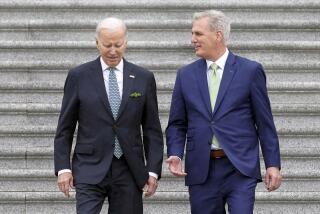Global Trade Accord Gets a Boost : Commerce: In wake of North American free trade vote, GATT negotiators are optimistic that they may meet next month’s deadline for the long-stalled pact.
- Share via
BERLIN — Visibly buoyed by this week’s House passage of the North American Free Trade Agreement, negotiators in Geneva struggling to conclude a long-stalled accord on global tariff reductions talked Friday of a new atmosphere that could help them succeed.
Peter Sutherland, director general of the General Agreement on Tariffs and Trade, told negotiators in a statement Friday: “Following the vote in the U.S. Congress on NAFTA, the overall climate to conclude the negotiations has rapidly improved.”
One GATT official summed up the mood as “very positive” and added: “There’s a feeling now that this whole thing may be doable after all.” Dec. 15 has been set as the deadline for a final agreement.
But Sutherland was also cautious in his statement to negotiators, stressing that “it is now particularly urgent” for the European Community and the United States--two of the world’s largest trading entities--to resolve the issues that still divide them.
Differences between the United States and the EC, especially on agricultural subsidies, have long been seen as the biggest stumbling block to an agreement.
Talks scheduled for Monday and Tuesday in Washington between U.S. Trade Representative Mickey Kantor and chief EC trade negotiator Leon Brittan are considered crucial if the December deadline is to be met.
“This is a critical session,” said Andrew Stoler, the senior U.S. representative to GATT. “It is extremely important to get a breakthrough in Washington to give us what we need.”
Technically complex and seemingly abstract, the Geneva trade talks are about freeing exports and imports among all nations in a way that would give a major push to world economic growth.
The Paris-based Organization for Economic Cooperation and Development has projected that a GATT agreement could add more than $250 billion to the global economy shortly after the turn of the century.
Now in their seventh year of negotiations, delegates are working against the deadline to resolve the final, crucial issues that many believed were irreconcilable as recently as several weeks ago.
U.S. officials at the talks, for example, said they detected a shift in the mood even before the NAFTA accord, when French representatives suddenly stopped dismissing Dec. 15 as a meaningless deadline.
Officials at the EC mission in Washington, long familiar with the ups and downs of the transatlantic tensions in the talks, also seemed unusually optimistic.
Steadfast French refusal to go along with concessions already agreed between the EC and the United States on the sensitive issue of agricultural subsidies has been one of the toughest problems.
Pledges by French politicians earlier this year, assuring their farmers that they would not give ground, seemed to leave the country’s negotiators little room to maneuver.
However, encouraging signs in Geneva, coupled with recent actions at home on the part of French Prime Minister Edouard Balladur, have raised hopes that France may be prepared to move.
In recent weeks, for example, Balladur has quietly met with representatives from trade unions and the farmers opposed to any concessions, and this week he approved an additional $250 million in financial assistance to the agricultural sector.
Collectively, the moves have been interpreted by observers in Paris as preparation for a French shift that would allow agreement with the United States on the farms subsidies issue.
But agriculture is not the only issue on which breakthroughs are still needed.
The EC--again at French insistence--wants to place quotas on movies and other audiovisual products, a move strenuously opposed by the United States and its multibillion-dollar motion picture industry.
In another area, the United States drew strong criticism Friday for its objections to a package that would reduce international barriers to the free flow of insurance, banking and other financial services.
American representatives said the United States is willing to offer such access only on a reciprocal basis, a move that would appear to exclude several Asian nations.
Times staff writers Scott Kraft in Paris and James Gerstenzang in Washington contributed to this report.
More to Read
Sign up for Essential California
The most important California stories and recommendations in your inbox every morning.
You may occasionally receive promotional content from the Los Angeles Times.










